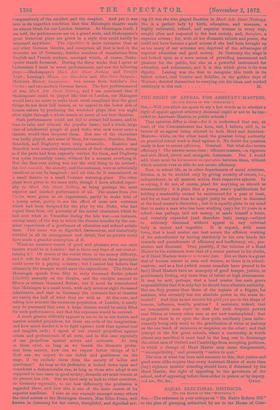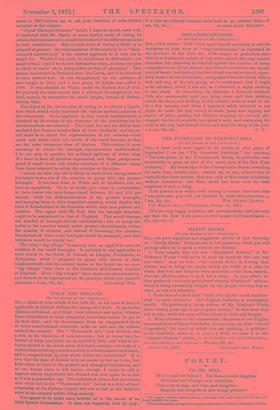EQUAL ELECTORAL DISTRICTS.
[TO THE EDITOR OF THE"SPECTATOR."]
Sin,-.-The reference in your critique on "Mr. Butt's Reform Bill' to the plan of grouping submitted by me to the House of Corn. mons in 1868 induces me to ask your insertion of some further remarks on the subject.
"Equal Electoral Districts" would, I have no doubt, work well, if combined with Mr. Hare's or some similar mode of voting, by which a fair representation would be obtained of the different opinions in each constituency. But no such mode of voting is likely to be adopted at present ; the representation of the minority in a " three- cornered constituency" is the nearest approach to it that can be hoped for. Would it not, then, be injudicious to disfranchise our small towns? And if we do not disfranchise them, is there any plan so likely to render them independent as that of grouping? This system has existed in Scotland since the Union, and it is admitted to have worked well. It was strengthened by the addition of new burghs in 1832, and a new group of burghs was added in 1868. It was adopted in Wales under the Reform Act of 1832, for precisely the same reason that I advocate its adoption in Ire- land, namely, to strengthen the small burghs, instead of disfran- chising them.
The object of Mr. Hare's plan of voting is to obtain a legisla- ture which would really represent the various political opinions of the community. Some approach to this varied representation is obtained by the variety in the character of the constituencies by which members are returned. The Land Act and the Ballot have rendered the farmers indepenaent of their landlords, and the re- sult must be to throw the representation of our counties—both north and south—into the hands of the small farmers, as they are the most numerous class of electors. This renders it more necessary to retain the borough representation undiminished. I do not stop to consider the political opinions of either class.
We want to have all opinions represented, and those groups com- posed of small towns will return members of a different stamp from those returned by either the counties or the cities.
I cannot see that any evil is likely to result from taking some of the larger towns out of the counties to group with the present boroughs. It has been done in Wales and in Scotland, and we hear no complaints. To do so would give votes to householders in those towns who have houses rated between £4 and 112 per annum ; while the disfranchisement of the present boroughs, and merging them in their respective counties, would deprive this class of householders of the franchise which they now possess and exercise. You agree with Mr. Butt that the borough franchise ought to be assimilated to that of England. This would increase the number of borough electors considerably ; but to merge the towns in the counties would, under present circumstances, reduce the number of electors, and instead of leavening the counties, the electors of these small boroughs would be swamped, and their influence would be wholly lost.
The term "big village " is scarcely fair, as applied to even the smallest of our small boroughs. It certainly is not applicable to such towns in the North of Ireland, as Lurgan, Portadown, or Ballymena, which I proposed to group with others in their neighbourhood, and the country towns in the South are no more "big villages" than those in the Southern and Eastern counties of England. Even "big villages" have their own characteristics, and deserve to be represented on the principle which you yourself



































 Previous page
Previous page